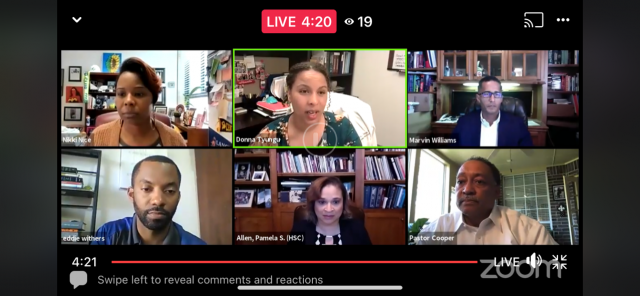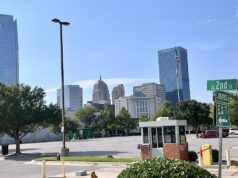

OKC Ward 7 Councilwoman Nikki Nice hosted a virtual town hall examining COVID-19 vaccines and the Black community Sunday evening that touched on subjects ranging from the Tuskegee Experiments to vaccine ingredients.
The 90-minute panel (video embedded below) included Dr. Donna Tyungu, Dr. Marvin Williams, Dr. Pamela Allen and Eddie Withers, who serves as lead epidemiologist at the Oklahoma City County Health Department.
Vaccine hesitancy and appointment access have been ongoing concerns in Black and other minority communities around the nation. A recent Kaiser Family Foundation study found that whites are vaccinated at a rate 1.6 times higher than Black Americans. Data have also shown Blacks dying at a rate 1.4 times higher than white Americans.
Withers said about 8 percent of the Black population in Oklahoma County has been vaccinated so far.
Moderna vs. Pfizer vs. Johnson & Johnson
Nice said one common question she hears about the vaccine involves which version is the best. The answer: For the most part, the one you can get.
“I get asked a lot what is the best, and my answer is the one that gets into your arm,” Allen said. “Both are protective against developing extreme severe complications from the virus. If it is offered to you, don’t pass it up for something you think will be better.”
Tyungu said the side effects for both Moderna and Pfizer are mild and quickly disappear in most who receive the vaccines.
“Most people that get Pfizer or Moderna will get some type of arm pain,” she said. “With the second dose you typically see the adverse events a little bit worse, but typically those are gone within 36 hours after receiving the dose.”
Both Tyungu and Williams said the Johnson & Johnson vaccine is likely safe, but in the future its use may be discouraged among women who are on birth control. The administration of that vaccine has been halted by the FDA after six people experienced serious side effects related to blood clots. One patient died.
Ingredients ‘not going to change things about you’
One viewer asked the panel if the ingredients in the vaccines can be harmful down the road. Williams said the vaccine does not change DNA.
“I think the most important thing is that these vaccines aren’t going to change your DNA,” he said. “It’s going to teach your body how to heal with the infection, but it’s not going to change things about you.”
Tyungu said the vaccine is fairly simple when it comes to ingredients.
“This is a very clean vaccine,” she said. “That means there’s few components. There are some sugars, there’s a lipid coat and the mRNA that teaches your body to make antibodies. The mRNA is degraded quickly after it’s received. It’s there long enough to show your body how to make antibodies, but then all the vaccine stuff is degraded so it doesn’t stay around for years and years.”
History plays role in skepticism, hesitancy
Allen said many in OKC’s Black community remain skeptical of the vaccine and that hesitancy stems from past cultural experience. That includes the now-infamous Tuskegee Experiment in which hundreds of Black men were falsely offered treatment for syphilis. In reality, the program was an experiment to determine the effects of long-term exposure to the disease, and the men never received the treatment they were promised. The experiment ran between 1932 and 1972 and only ended when it was exposed in a report by the New York Times.
Allen said she understands why issues like that still resonate in her community, but she said now is not the time to let that skepticism cause someone to avoid getting vaccinated.
“We hear you, and your mistrust is valid. But at the same point, on this issue of COVID, this is different,” she said. “This is a global issue. This pandemic has affected all of us no matter the color of our skin. We have to realize we are dying at a disproportionate rate relative to numbers in our population, and I dare say that none of us can say we don’t know someone personally who has died or been affected by this virus.”
Allen added: “This is not a time to be at the back of the bus.”
Withers said vaccination rates among Black men and women are lagging in Oklahoma County.
“In the Caucasian community, the numbers are nose diving,” he said. “They are getting the vaccination more than in communities of color. Ours is just a steady line. That’s a concern for those of us who look at the numbers on a regular basis. We’re going to have to take a sense of ownership on this.”
Watch the full OKC town hall




















